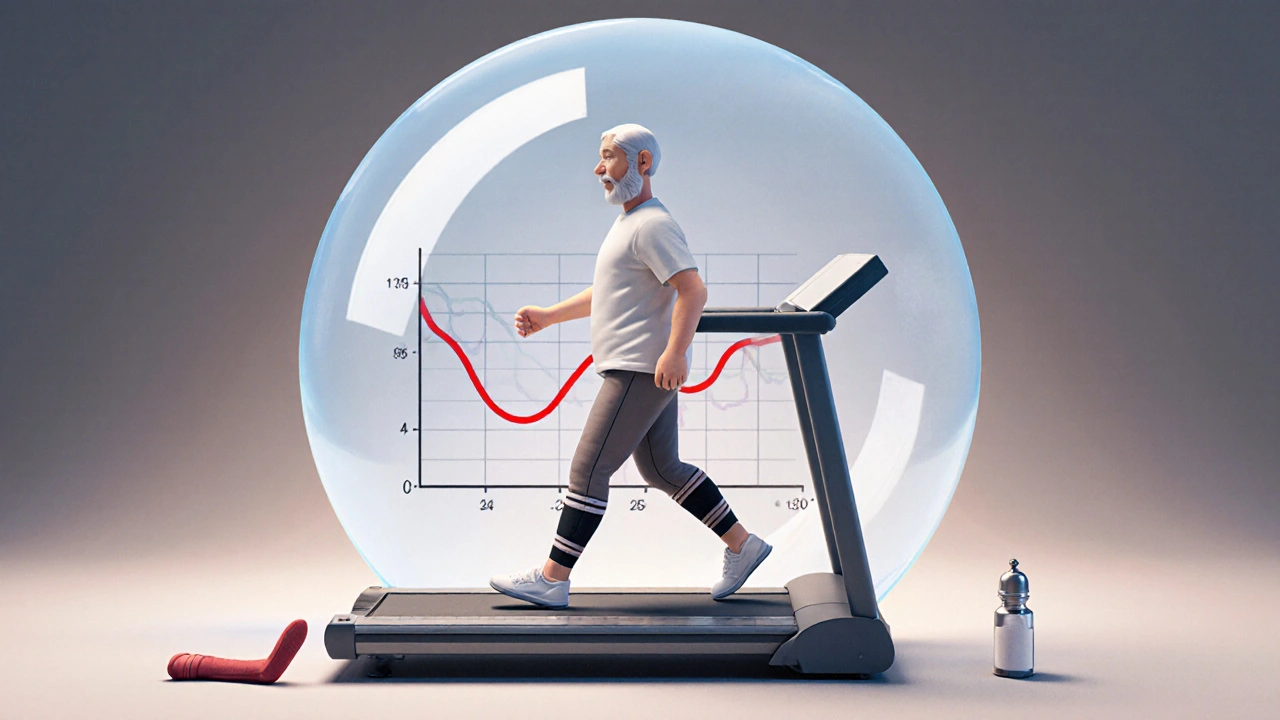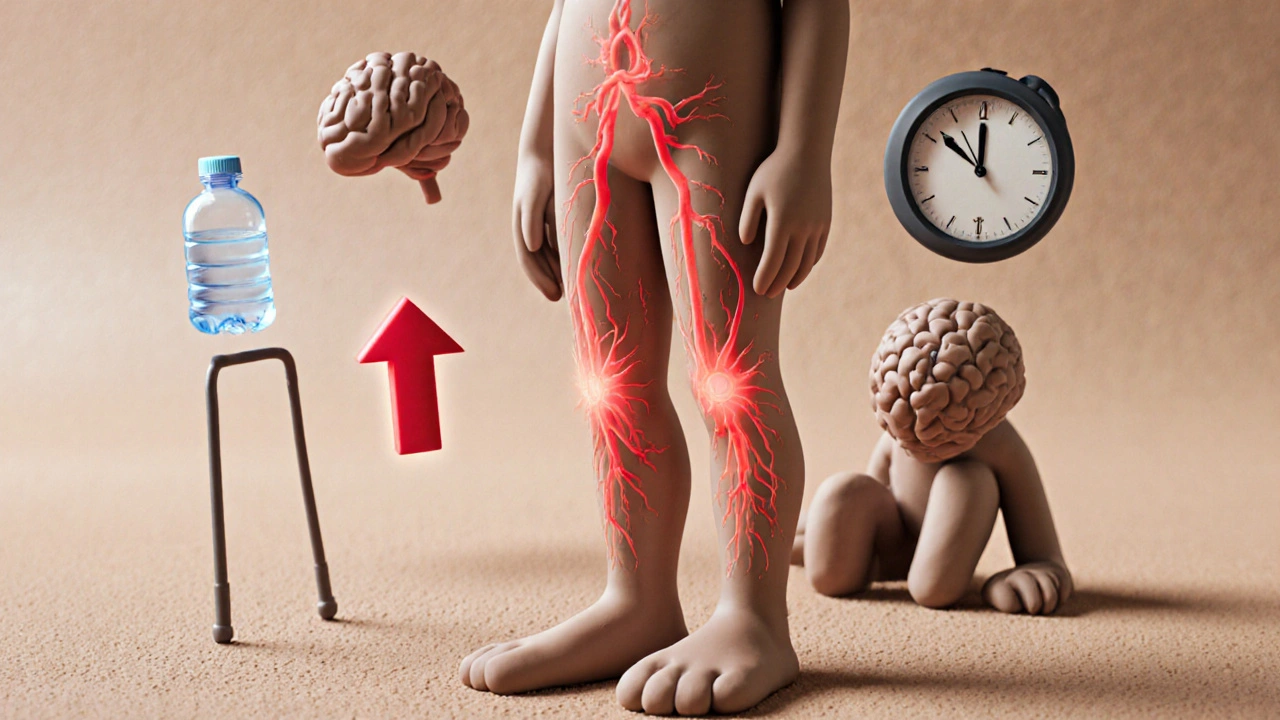If you’ve been told to take midodrine for low blood pressure, you might wonder: can it help me get through a walk, climb stairs, or even do light workouts without passing out? The short answer is yes-but not in the way most people hope.
What Midodrine Actually Does
Midodrine is not a stimulant. It doesn’t give you energy like caffeine or a pre-workout supplement. Instead, it’s a vasoconstrictor. That means it tightens your blood vessels, especially in your legs and abdomen, to push more blood back toward your heart and brain. This raises your blood pressure-usually within 30 to 60 minutes after taking it.
The FDA approved midodrine for orthostatic hypotension, a condition where your blood pressure drops when you stand up. People with this often feel dizzy, lightheaded, or black out. For them, midodrine can mean the difference between falling in the shower and getting to the bathroom safely.
But here’s the catch: midodrine doesn’t fix the root cause. It doesn’t improve heart function, lung capacity, or muscle endurance. It just holds your blood pressure up so your body doesn’t collapse when you stand-or move.
How Midodrine Affects Physical Activity
People who take midodrine often report feeling stronger during daily tasks. They can stand longer. Walk farther. Carry groceries without getting woozy. That’s not stamina in the athletic sense. It’s stability.
A 2022 study in the Journal of Clinical Hypertension followed 87 patients with neurogenic orthostatic hypotension who took midodrine before light exercise. Those who took the drug were able to walk 22% longer on a treadmill without symptoms compared to placebo. Their heart rates didn’t spike more than usual, but their blood pressure stayed stable. That’s the key.
Midodrine doesn’t make your muscles work harder. It just keeps your brain from being starved of blood when you move. So if you’re tired because your body can’t circulate blood properly, midodrine removes that barrier. You’re not gaining endurance-you’re removing a bottleneck.
When Midodrine Helps With Exercise
Midodrine helps with physical activity only if your fatigue comes from low blood pressure when upright. That’s common in:
- Parkinson’s disease
- Diabetic neuropathy
- Autonomic failure
- Long COVID (in some cases)
- Postural Orthostatic Tachycardia Syndrome (POTS)
For these people, exercise isn’t hard because they’re out of shape. It’s hard because their body fails to regulate pressure. Midodrine can make walking, stretching, or even standing in line feel possible again.
One patient in a UK support group told me she used to need to sit down after every three steps. After starting midodrine, she could walk her dog for 20 minutes without stopping. That’s not a marathon. But it’s life-changing.

When Midodrine Won’t Help
If your fatigue comes from:
- Low iron (anemia)
- Thyroid problems
- Chronic fatigue syndrome without orthostatic issues
- Heart failure
- Dehydration or poor nutrition
then midodrine won’t give you more stamina. You might even feel worse. Tightening blood vessels when your heart is already struggling can increase strain. It’s like forcing water through a clogged hose-pressure goes up, but flow doesn’t improve.
Doctors won’t prescribe midodrine for general fatigue. It’s not a performance enhancer. It’s a circulatory tool. If your blood pressure doesn’t drop when you stand, midodrine does nothing useful-and can cause side effects like scalp tingling, goosebumps, or high blood pressure while lying down.
How to Use Midodrine for Exercise
If your doctor says midodrine is right for you, timing matters. The drug peaks in 1 to 2 hours and lasts about 4 hours. So:
- Take your dose 30 to 60 minutes before planned activity
- Avoid taking it after 6 PM-it can raise your blood pressure while lying down, disrupting sleep
- Drink water before and after. Dehydration makes midodrine less effective and increases side effects
- Start low: 2.5 mg once daily, then increase only under medical supervision
Don’t take it right before intense workouts. Midodrine doesn’t improve oxygen delivery or muscle recovery. It’s not for sprinting, weightlifting, or HIIT. It’s for walking, gardening, or standing at your desk without passing out.

Side Effects and Risks
Midodrine is generally safe when used correctly. But here’s what you might feel:
- Itchy scalp or tingling skin (very common)
- Goosebumps (because it activates tiny muscles under the skin)
- High blood pressure when lying down (can cause headaches or blurred vision)
- Urinary retention (especially in men with prostate issues)
Never take midodrine if you have severe heart disease, kidney failure, or uncontrolled high blood pressure. It can make these worse.
One 2023 review in Neurology Clinical Practice found that 12% of users stopped midodrine due to side effects-mostly the scalp tingling and sleep disruption. That’s not rare. It’s common enough that doctors warn patients upfront.
What Works Better Than Midodrine for Stamina?
If your goal is real stamina-more energy, endurance, strength-midodrine isn’t the answer. Here’s what actually helps:
- Compression stockings: These squeeze your legs and help blood return to your heart. Many patients use them with midodrine for better results.
- Increased salt and fluids: More fluid in your bloodstream means more pressure. Doctors often recommend 2-3 liters of water and 8-10 grams of salt daily.
- Physical therapy: Graded exercise programs, especially reclined cycling or swimming, train your body to handle upright movement better over time.
- Posture training: Learning to cross your legs, tense your thighs, or squat slightly when standing can prevent sudden drops in pressure.
These aren’t magic. But they fix the problem, not just mask it.
Bottom Line
Midodrine doesn’t make you stronger or more energetic. It doesn’t improve lung capacity or muscle endurance. But if your stamina crashes because your blood pressure drops when you stand, it can be a game-changer.
Think of it like a crutch-not a rocket. It won’t make you run faster. But if you’re about to fall every time you stand, it lets you stand at all.
For people with autonomic disorders, that’s enough. For everyone else, it’s a waste of time-and risk.
Can midodrine improve my running endurance?
No. Midodrine doesn’t increase oxygen delivery, muscle strength, or cardiovascular fitness. It only raises blood pressure to prevent dizziness when standing. If your running fatigue comes from low blood pressure upon standing, it might help you get started-but not sustain effort. For true endurance, focus on hydration, compression, and gradual training.
How long does midodrine take to work before exercise?
Midodrine usually starts working within 30 minutes and reaches its peak effect in 1 to 2 hours. For best results, take it 45 to 60 minutes before planned activity. Its effects last about 4 hours, so timing is key-don’t take it late in the day.
Is midodrine safe for long-term use?
Yes, for many people with chronic orthostatic hypotension. Studies show it’s safe for years when used as directed. But regular monitoring is needed-especially for blood pressure while lying down. Side effects like scalp tingling or urinary issues may develop over time. Always follow up with your doctor every 6 to 12 months.
Can I take midodrine with other medications?
Be careful. Midodrine can interact with beta-blockers, decongestants, and certain antidepressants. Combining it with other blood pressure drugs can cause dangerously high pressure. Always tell your doctor and pharmacist about every medication you take-including supplements like licorice root or caffeine pills.
Does midodrine help with fatigue from Long COVID?
Some people with Long COVID who have orthostatic intolerance (like POTS) do benefit from midodrine. If standing causes dizziness, brain fog, or rapid heartbeat, it may help. But if your fatigue is from muscle weakness, sleep issues, or inflammation, midodrine won’t help. Testing for orthostatic hypotension is required before considering it.
If you’re considering midodrine for exercise-related fatigue, ask your doctor for a tilt table test. That’s the only way to know if your problem is truly low blood pressure-or something else entirely.

